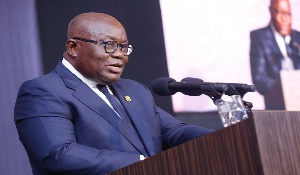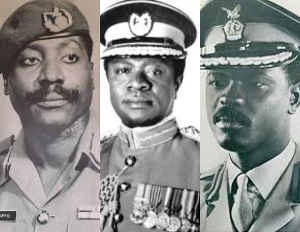Akufo Addo led New Patriotic Party [NPP] administration is working against the clock to actualize its dream of creating 6 new administrative regions in Ghana through a constitutional requirement of referendum. A sovereign referendum is different from a popular referendum.
It appears the anticipated referendum on the new regions is heading towards a pivotal sticking point as litigations are likely to loom. “Apart from inhabitants of the northern sector of the Volta Region, the rest of the region may not be allowed to partake in the referendum that would lead to the creation of a new region out of the existing region.President Nana Akufo-Addo disclosed this during a durbar held in his honor at Dambai for heeding to calls for the creation of a new region.
The President explained that best practices across the world allow only those affected by the referendum to take part in such polls. Referring to a similar exercise in 1956 that led to Trans-Volta Togo land joining Ghana, the President recounted that only those in that area were allowed to partake in the voting” (Source: graphic.com.gh, July 13, 2017). If lawyers are the scoreboards of democracy, journalists and historians are the scorekeepers! I think my president got it wrong on the referendum!
This is a popular referendum not a sovereign referendum. An example of sovereign referendum is Catalan independence referendum of 2017 in Catalonia, Spain. Even after the referendum, the Spanish government took the needed approach to curb the Catalan secessionists drive in Catalonia.
Spain’s Prime Minister, Mariano Rajoy asserted that the Catalans were hoodwinked into thinking that there was independence Referendum in politically restive and economically buoyant Catalonia.
Mr. President, referendum based on petitions [popular referendum] in a unitary Country like Ghana affects every Ghanaian tax payer. It affects the numerical strength of the entire province, therefore, the imperative need for every voter in the entire affected regions [not the petitioners] to vote in the referendum.
Also, and historically, the circumstances that led to the Trans-Volta Togoland [TVT] plebiscite in 1956 were diametrically different from the thoroughgoing anticipated referendum on the New Regions. Ghana’s best president so far, Nkrumah’s tacit diplomatic brinkmanship, astuteness and tenacity somewhat contributed to the 1956 plebiscite on Ewe Question [Whether TVT was to join independence in Ghana or independence in Togo]. Nevertheless, TVT also known as the British Togoland was a territory under the United Nations [UN] Trusteeship Council.
The UN charter established the trusteeship council as one of the many organs of the organization. The foregoing organ was responsible for supervising the administration of Trust territories under the trusteeship system. The purpose of the trusteeship council was among other things to ensure the advancement of the inhabitants of trust territories and their progressive development toward self-rule.
The trusteeship council was abolished in November 1994, a month after the last territory under the council, Palau gained independence. Palau is an archipelago [group of islands] in the western Pacific Ocean. Therefore, Mr. President, there is no correlation between the 1956 Plebiscite which was partly master-minded by UN Trusteeship Council and the proposed six New Regions referenda apparently under 1992 constitution.
Besides, it is unconstitutional for a president to promise and declare who votes in a referendum. Per 1992 constitution, that is the core mandate of the electoral commission [EC]. The 1992 constitution did not allow politicians to overlap their roles with EC.
Suffice it to say that every referendum is shrouded in a political quandary and, as Franklin D. Roosevelt observed: “in politics, nothing happens by accident. If it happens, you can bet it was planned that way.”
The basic conundrum is, does the referendum which is a political question affect the entire inhabitants of the region or the secessionists [petitioning inhabitants]? Do we have a referendum law or politicians have to adopt their own tactics to organize a referendum? Referendum Act 1977 (SMCD 143), presents some grey areas as it was not clear on who must vote in a plebiscite.
That is why the framers of 1992 constitution mandated only the electoral commission to determine how a referendum should be organized. Chapter 2 clause (4) and (5) of the 1992 constitution states that “(4) Where a commission of inquiry appointed under clause (2) and (3) of this article finds that there is the need and a substantial demand for the creation, alteration or merger referred to in either of those clauses, it shall recommend to the President that a referendum be held, specifying the sues to be determined by the referendum and the places where the referendum should be held.
(5) The President shall refer the recommendations to the Electoral Commission, and the referendum all be held in a manner prescribed by the Electoral Commission.”
Clause (2) and (3) of the constitution states that “(2) If the President, upon a petition being presented to him and, on the advice of the Council of State, is satisfied that there is substantial demand for - (a) the creation of a new region; (b) the alteration of the boundaries of a region, whether or not the alteration involves the creation of a new region; or (c) the merger of any two or more regions; he shall, acting in accordance with the advice of the Council of State, appoint a commission of inquiry to inquire into the demand and to make recommendations on all the factors involved in the creation, alteration or merge.
(3) If, notwithstanding that a petition has not been presented to him, the President is, on the advice of the Council of State, satisfied that the need has arisen for taking any of the steps referred to in paragraphs (a), (b) and (c) of clause (1) of this article, he may, acting in accordance with the advice of the Council of State, appoint a commission of inquiry to inquire into the need and to make recommendations on all the factors involved in the creation, alteration or merger.” Per clause five, President Akufo-Addo has no power to tell Dambia people that only the affected areas will vote in the referendum. If those demanding are those voting, then referendum is a waste of tax payers’ money because the answer is implicitly known already!
To play Devils’ advocate, even the affected areas involved the entire region! Redefining a boundary of a region affects the entire region. There is a little or no economic justification for creating New Regions.
For example, Ashanti Region [AS] is the most populated province in Ghana, yet poverty rate in this region is lower than Central and the two Upper Regions which are comparatively smaller than [AS]! So, there is no relationship between the size of a region and development. Geographically, the land area of Mali is almost 4 times that of Ghana, yet, there are 8 regions in Mali plus one Bamako, district capital. Here are my humble suggestions, Mr. President.
• Make Sunyani the second administrative Capital of Ghana with some of government agencies there. The Capital of Republic of South Africa is in Pretoria, but their parliament is in Cape Town. Ghana can learn from them by moving parliament and some other relevant headquarters like Cocobod or Supreme Court to Sunyani. This will reduce the financial burden of finding accommodations for law makers in Accra. Sunyani because Kumasi is already congested.
• Then, move the Capital of Brong Ahafo from Sunyani to Techiman. Techiman because it is strategically located in the region!
• In consultation with regional House of Chiefs or by executive instrument change the name of Brong Ahafo region to middle belt region to promote inter-tribal integration.
• Replicate the idea of second capital throughout the 10 regions. For example, the second capital of Brong Ahafo could be Goaso or Atebubu. That of Volta region could be moved to Nkwanta or Dambai.
• Deputy regional ministers must be stationed at the second capital. Funds for these new Regions could be used to employ more teachers and nurses or build hospital. That funds could be used to improve teachers/nurses’ conditions of service, build factories and provide ambulance for hospitals.
Ghana needs modern railway lines to connect its regions. Say no to the creation of tribal region, it is a rebuke to national identity and national integration.
God Bless Our Homeland Ghana!
By Nana Yaw Osei, Minnesota, USA.
n_yawosei@hotmail.com
Opinions of Wednesday, 25 July 2018
Columnist: Nana Yaw Osei















